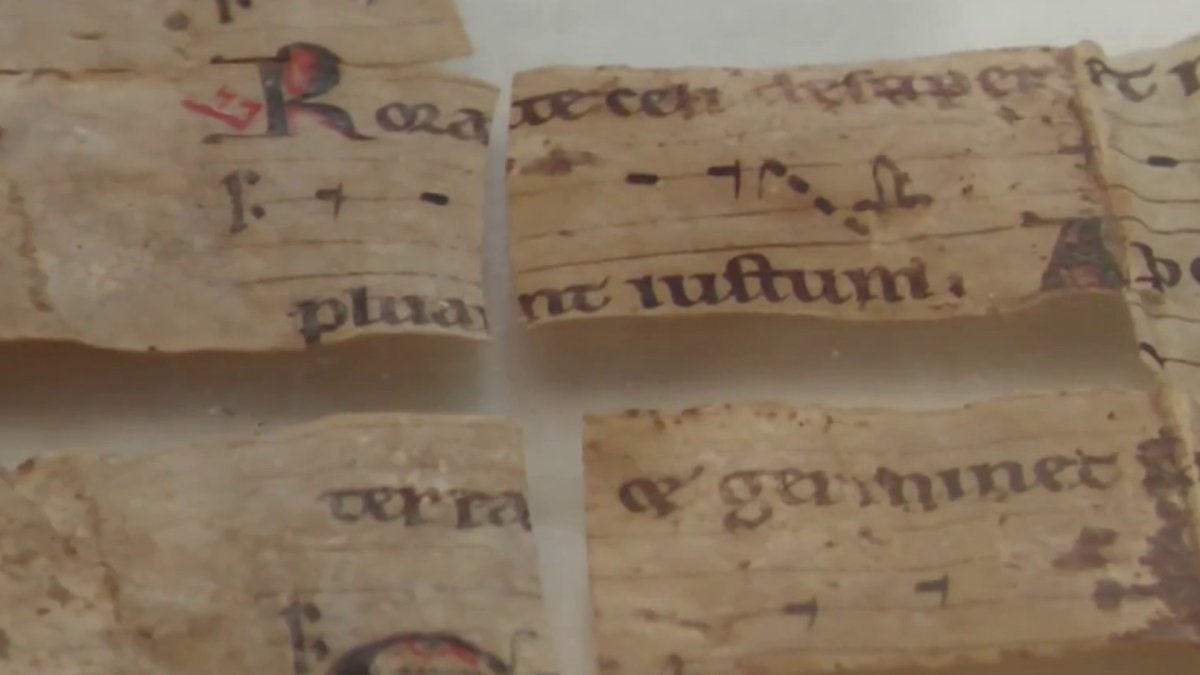
A Ridgefield man is collaborating with a team of academics to learn more about history and music after discovering Medieval musical manuscripts that are 800 years old.
A Ridgefield man is collaborating with a team of academics to learn more about history and music after discovering Medieval musical manuscripts that are 800 years old.
Hundreds of books surround Nicholas Alexander in his Ridgefield home.
“It's just nice to have them as old friends,” Alexander said.
Many, found on hidden shelves in secondhand bookstores, are centuries old. A restoration project of some 18th century French books in Alexander’s collection sent him to a bookstore in Boston this past summer.
Get Connecticut local news, weather forecasts and entertainment stories to your inbox. Sign up for NBC Connecticut newsletters.
“They had some nice leather books that were on sale for not very much,” he said.
As he took them apart to reuse the covers, Alexander made an unexpected discovery.
“I found what looks like music, but very strange music, peeking out from the back of the books,” he said.
Local
Alexander had inadvertently discovered the French Medieval music manuscripts.
“When the United States was founded, these fragments were already in the books, they'd already had half a millennium of religious history happen,” Alexander said.
Five hundred years after these manuscripts were created, they became nothing more than scrap, used in the bindings of French books in the 1700s.
“For a user of the book, you'd never know that the fragments were in here, they'd have been completely hidden,” Alexander said.
After making the discovery, Alexander was quick to obtain the remaining 23 volumes of the set that were available. He then spent hours matching up pieces in the trove of Medieval material.
“This was a great big jigsaw puzzle,” he said.
A puzzle he is not solving alone, now teaming up with an academic team in Canada.
“I can sort of solve, kind of like a crossword puzzle,” Dr. Anna de Bakker, musicology postdoctoral research associate and researcher at McGill University, said.
Dr. de Bakker is an expert in European chant music. She is transcribing the Latin text and musical notes, as Alexander matches up pieces from his collection for upload to a digital database.
The expert opinion: the fragments would have been part of a book used in a 13th century Catholic monastery in northern France or Belgium by a Cistercian order of monks. Dr. de Bakker said finding musical manuscripts that date back to the 1200s is extremely rare.
Yet even as the pages reveal insight into the past, they present mysteries.
“We don't know exactly which monastery this came from, but we have an interesting clue because we know which books they got bound in,” Dr. de Bakker said. “It’s around the 18th century that this particular monastery decided they didn't need this book anymore. For example, it might tell us it was a monastery affected by the French Revolution.”
The scraps of history open a window into the Medieval monastic world.
“For 500 years, this music was used probably every day. It was sung as a chant music by the monks in the abbey,” Alexander said.
The pieces also reveal the evolution of music through the centuries.
“We haven't fully worked out what it all means. We don't know fully how all the notes would have sounded if they’re sung,” Alexander said.
Alexander’s next goal is to get the manuscripts permanently displayed in a museum, hoping to share fragments of history with posterity.
“Something incredibly special, just by luck or by fate, or by act of God, had been placed into my hands, in my custodianship, and it just made me feel very humbled,” Alexander said. “It just creates a new perspective on what time really means.”
Anyone interested in discussing an exhibition of the manuscripts with Alexander should email him at ridgefieldfragments@gmail.com.